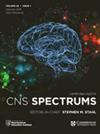历史文化旅游对游客混合性抑郁的改善作用
IF 3.4
3区 医学
Q2 CLINICAL NEUROLOGY
引用次数: 0
摘要
混合性抑郁症是一种常见的心理健康问题,对患者的生活和社会功能造成极大的困扰。由于历史文化旅游具有交际特征,可能对改善抑郁症症状有积极作用,被认为对混合性抑郁症的改善有影响。研究对象与方法采用随机对照试验设计,纳入100例混合性抑郁症患者。干预组接受为期8周的历史文化旅游干预,对照组继续接受常规心理治疗。分析工具使用SPSS23.0。结果在研究结束时,干预组患者的抑郁症状在汉密尔顿抑郁量表和生活质量问卷中有显著改善。与对照组相比,干预组的抑郁症状减轻了30%。此外,干预组的生活质量也有明显改善,比对照组提高了20%。结论历史文化旅游对改善混合性抑郁症患者的症状和生活质量有积极作用。历史文化旅游通过提供新的感官和认知体验,可以转移患者的注意力和情绪,缓解患者的抑郁症状。历史文化旅游与药物、心理治疗相结合,可以成为一种有效可行的治疗方法,为混合性抑郁症患者提供了新的选择和治疗手段。本文章由计算机程序翻译,如有差异,请以英文原文为准。
Improving effect of historical and cultural tourism on mixed depression of tourists
Background Mixed depression is a common mental health problem that causes great distress to the patient’s life and social functioning. Due to historical and cultural tourism having communicative characteristics, it may have a positive effect on improving the symptoms of depression and is considered to affect improving mixed depression. Subjects and Methods A randomized controlled trial design was used in this study, which included 100 patients with mixed depression. The intervention group received an 8-week historical and cultural tourism intervention, while the control group continued to receive conventional psychotherapy. The analysis tool uses SPSS23.0. Results At the end of the study, patients in the intervention group showed significant improvement in depressive symptoms as measured by the Hamilton Depression Scale and Quality of Life questionnaire. Depression symptoms were reduced by 30 % in the intervention group compared to the control group. In addition, life quality in the intervention group also improved significantly, by 20% compared to the control group. Conclusions Historical and cultural tourism has a positive effect on improving the symptoms and life quality of patients with mixed depression. By providing new sensory and cognitive experiences, historical and cultural tourism can divert patients’ attention and emotions, and alleviate their depressive symptoms. The combination of historical and cultural tourism with drug and psychotherapy can become an effective and feasible treatment method, which provides a new choice and treatment means for patients with mixed depression.
求助全文
通过发布文献求助,成功后即可免费获取论文全文。
去求助
来源期刊

CNS Spectrums
医学-精神病学
CiteScore
6.20
自引率
6.10%
发文量
239
审稿时长
>12 weeks
期刊介绍:
CNS Spectrums covers all aspects of the clinical neurosciences, neurotherapeutics, and neuropsychopharmacology, particularly those pertinent to the clinician and clinical investigator. The journal features focused, in-depth reviews, perspectives, and original research articles. New therapeutics of all types in psychiatry, mental health, and neurology are emphasized, especially first in man studies, proof of concept studies, and translational basic neuroscience studies. Subject coverage spans the full spectrum of neuropsychiatry, focusing on those crossing traditional boundaries between neurology and psychiatry.
 求助内容:
求助内容: 应助结果提醒方式:
应助结果提醒方式:


